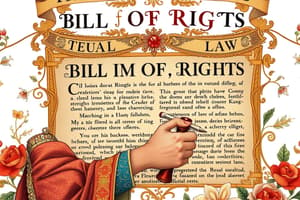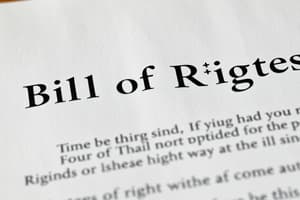Podcast
Questions and Answers
What are the first ten amendments to the United States Constitution called?
What are the first ten amendments to the United States Constitution called?
- The Articles of Confederation
- The Declaration of Independence
- The Bill of Rights (correct)
- The Constitution
What is guaranteed by the First Amendment?
What is guaranteed by the First Amendment?
Freedom of Worship, Speech, Press, Assemble, and Petition
What right does the Second Amendment protect?
What right does the Second Amendment protect?
The right to bear arms
What does the Third Amendment address?
What does the Third Amendment address?
What do the Fourth Amendment protect against?
What do the Fourth Amendment protect against?
What rights are protected under the Fifth Amendment?
What rights are protected under the Fifth Amendment?
What guarantees does the Sixth Amendment provide?
What guarantees does the Sixth Amendment provide?
What rights do the Seventh Amendment address?
What rights do the Seventh Amendment address?
What does the Eighth Amendment protect against?
What does the Eighth Amendment protect against?
What does the Ninth Amendment state about rights?
What does the Ninth Amendment state about rights?
What does the Tenth Amendment reserve?
What does the Tenth Amendment reserve?
What is self-incrimination?
What is self-incrimination?
What does double jeopardy mean?
What does double jeopardy mean?
What is a grand jury?
What is a grand jury?
What does impartial mean in the context of a jury?
What does impartial mean in the context of a jury?
What are civil cases?
What are civil cases?
What are reserved powers?
What are reserved powers?
Flashcards are hidden until you start studying
Study Notes
The Bill of Rights
- Comprises the first ten amendments of the U.S. Constitution, ratified in 1791.
- Establishes three main categories of rights: individual freedoms, protection against government overreach, and rights for the accused.
The First Amendment
- Guarantees freedoms of religion, speech, press, assembly, and petition.
- Prohibits government punishment for expressing opinions and allows peaceful public gatherings.
The Second Amendment
- Sanctifies the right to bear arms, preventing infringement on individual ownership of weapons for self-defense.
The Third Amendment
- Protects citizens from being forced to quarter troops in their homes, emphasizing the right to privacy.
The Fourth Amendment
- Guards against unreasonable searches and seizures of property, requiring a warrant based on probable cause.
The Fifth Amendment
- Ensures legal rights including the right to a grand jury, protection against double jeopardy, and prohibits forced self-incrimination.
The Sixth Amendment
- Grants rights to those accused in criminal trials, including the right to a fair, speedy, and public trial by an impartial jury.
The Seventh Amendment
- Provides the right to a jury trial in civil cases; a jury's decision cannot be overturned by a judge.
The Eighth Amendment
- Protects against excessive bail, fines, and cruel and unusual punishments; emphasizes humane treatment in the justice system.
The Ninth Amendment
- Asserts that the enumeration of certain rights in the Constitution does not limit other rights retained by the people, affirming broader personal liberties.
The Tenth Amendment
- Clarifies that powers not delegated to the national government are reserved for the states, known as the "reserved powers clause."
Self-Incrimination
- Prohibits forcing individuals to testify against themselves during trial proceedings.
Double-Jeopardy
- Establishes that a person found "not guilty" cannot be tried again for the same offense.
Grand Jury
- A group of citizens that determines if there is sufficient evidence for prosecution, ensuring checks on governmental power.
Impartial
- Emphasizes that jurors in trials should remain unbiased, promoting fair legal proceedings.
Civil Cases
- Involve disputes between individuals or entities, addressing issues like finances, property, and divorce.
Reserved Powers
- Include state responsibilities such as setting speed limits, managing education systems, conducting elections, and regulating local businesses and professions.
Studying That Suits You
Use AI to generate personalized quizzes and flashcards to suit your learning preferences.




